牛津译林版英语七年级下册同步课件:Unit4 Finding your way period 3 Reading(18张PPT)
文档属性
| 名称 | 牛津译林版英语七年级下册同步课件:Unit4 Finding your way period 3 Reading(18张PPT) |  | |
| 格式 | zip | ||
| 文件大小 | 99.9KB | ||
| 资源类型 | 教案 | ||
| 版本资源 | 牛津译林版 | ||
| 科目 | 英语 | ||
| 更新时间 | 2022-05-13 22:07:47 | ||
图片预览

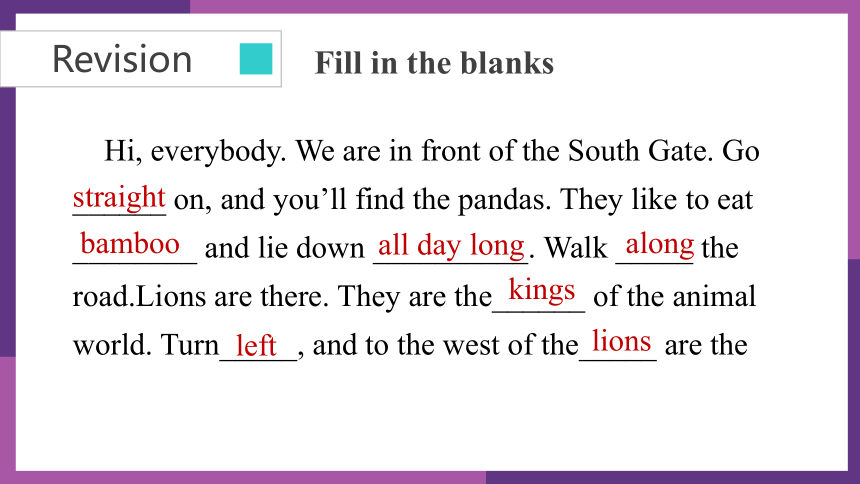
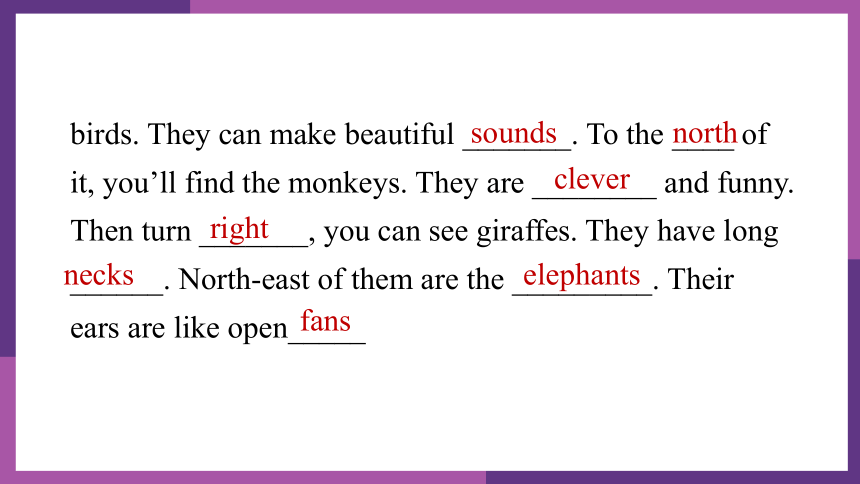
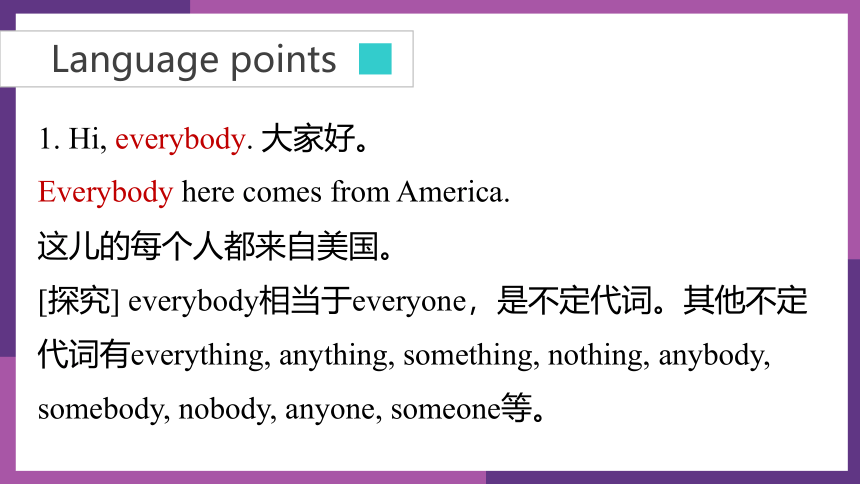
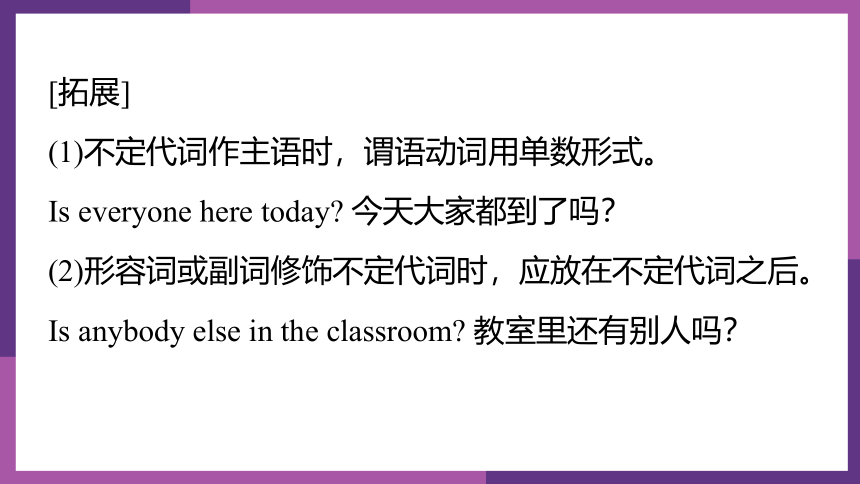
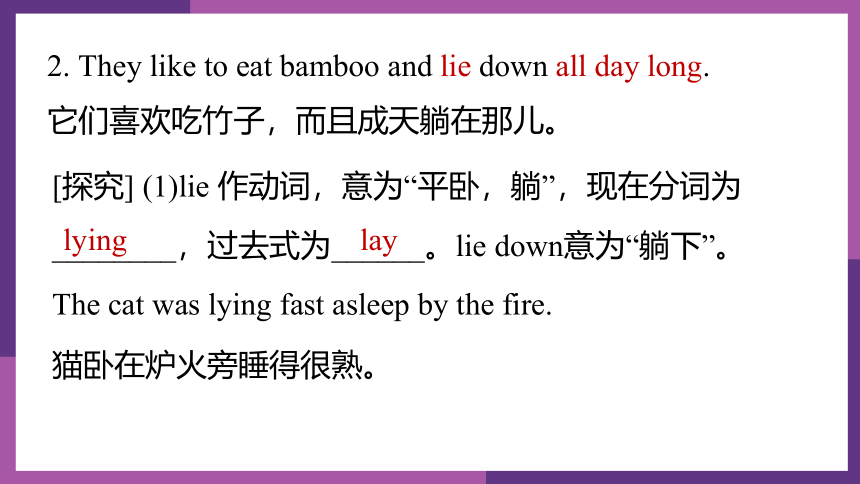

文档简介
(共18张PPT)
Unit 4 Finding your way
Reading(2)
Revision
Fill in the blanks
Hi, everybody. We are in front of the South Gate. Go ______ on, and you’ll find the pandas. They like to eat ________ and lie down __________. Walk _____ the road.Lions are there. They are the______ of the animal world. Turn_____, and to the west of the_____ are the
straight
bamboo
all day long
along
kings
left
lions
birds. They can make beautiful _______. To the ____ of it, you’ll find the monkeys. They are ________ and funny. Then turn _______, you can see giraffes. They have long ______. North-east of them are the _________. Their ears are like open_____
sounds
north
clever
right
necks
elephants
fans
Language points
1. Hi, everybody. 大家好。
Everybody here comes from America.
这儿的每个人都来自美国。
[探究] everybody相当于everyone,是不定代词。其他不定代词有everything, anything, something, nothing, anybody, somebody, nobody, anyone, someone等。
[拓展]
(1)不定代词作主语时,谓语动词用单数形式。
Is everyone here today 今天大家都到了吗?
(2)形容词或副词修饰不定代词时,应放在不定代词之后。
Is anybody else in the classroom 教室里还有别人吗?
[探究] (1)lie 作动词,意为“平卧,躺”,现在分词为________,过去式为______。lie down意为“躺下”。
The cat was lying fast asleep by the fire.
猫卧在炉火旁睡得很熟。
2. They like to eat bamboo and lie down all day long.
它们喜欢吃竹子,而且成天躺在那儿。
lying lay
(2)all day long 意为“整天地”。long在此处作副词,用在表示一段时间的名词之后,起强调作用。类似短语:all year long 全年地。
[拓展] (1)lie作动词,还可译为“说谎”,现在分词为lying,过去式为lied。
(2)lie作名词,意为“谎话,谎言”。tell a lie(=tell lies)意为“说谎”。
[探究] remember 作及物动词,意为“记得,记住”,后跟名词、代词、动词不定式或动名词作宾语。其反义词为forget,意为“忘记”。
3. Remember that they're dangerous. 记住它们危险。
I will remember to tell her about it. 我会记得告诉她那件事的。
[辨析] remember to do sth.与remember doing sth.
词条 意义及用法 例句
remember to do sth. 意为“记得去做某事”,强调事情还没做。 Remember to bring your book here tomorrow.
记得明天把你的书带到这里。
remember doing sth. 意为“记得做过某事”,强调事情已做。 I remember seeing you before.
我记得以前见过你。
[拓展]
某些动词后接动词不定式与动名词所表示的意义不同:
(1)forget to do sth. 忘记去做某事(还未做)
forget doing sth. 忘记做过某事(已做)
(2)stop to do sth. 停下来去做某事
stop doing sth. 停止做某事
(3)try to do sth. 努力做某事
try doing sth. 尝试做某事
[探究] 该句为祈使句的否定形式。
结构:Never+__________+其他.
Never be nervous, Linda! 琳达,不要紧张!
[拓展] 祈使句的常见否定形式:Don't+动词原形+其他.
Don't tell him the truth. 不要告诉他真相。
4. Never go near them. 不要靠近它们。
动词原形
[探究] (1)make 在此处作使役动词,意为“使……,让……”。常用结构为“make+宾语+形容词/动词原形”。
The news made him very happy. 这则消息使他非常高兴。
Tom made his little brother cry just now.
汤姆刚才把他弟弟弄哭了。
5. They jump around and make people laugh.
它们上蹿下跳,惹得人们大笑。
(2)laugh作动词,意为“笑”。常用短语为laugh at sb.,意为“嘲笑某人”。
The guests all laughed loudly. 客人们都大声地笑了。
Don't laugh at the poor. 不要嘲笑穷人。
[拓展] 常见的使役动词还有have, let等,后跟动词原形。
6. Cross the bridge, and you'll see the elephants.
过了这座桥,你们将会看见大象。
[探究] cross作及物动词,意为“穿过,横过”,指从平面上通过,常用于表示穿过马路、河流、桥、街道等,即cross the road/river/bridge/street。
[拓展] crossing n. 交叉路口
When you go to the crossing, turn right.
当你走到交叉路口时,向右拐。
[联想] cross相当于go across。across为介词,一般跟在动
词后。
课堂练习
1.John was so frightened that he couldn't make a ________ (声音).
2.Go ________ (径直地) on, and you will see the post office.
3.It's ________ (相当) necessary for students to do eye exercises every day.
4.Do you __________ (记得) the man in a red coat
5.The ________ (长颈鹿) is much taller than the deer.
根据句意及汉语提示完成句子
sound
straight
quite
remember
giraffe
6.Drive ________ (沿着) Green Street, and you will get there soon.
7.The Silk Road is a ________ (桥梁) of cultures between China and many other countries.
8.Kate is very friendly to _________________ (每人), so we all like her.
9.Let life be beautiful like summer flowers and death like autumn ________ (树叶).
10.Tom always makes me ________ (大笑).
along
bridge
everybody/everyone
leaves
laugh
GOOD JOB
Unit 4 Finding your way
Reading(2)
Revision
Fill in the blanks
Hi, everybody. We are in front of the South Gate. Go ______ on, and you’ll find the pandas. They like to eat ________ and lie down __________. Walk _____ the road.Lions are there. They are the______ of the animal world. Turn_____, and to the west of the_____ are the
straight
bamboo
all day long
along
kings
left
lions
birds. They can make beautiful _______. To the ____ of it, you’ll find the monkeys. They are ________ and funny. Then turn _______, you can see giraffes. They have long ______. North-east of them are the _________. Their ears are like open_____
sounds
north
clever
right
necks
elephants
fans
Language points
1. Hi, everybody. 大家好。
Everybody here comes from America.
这儿的每个人都来自美国。
[探究] everybody相当于everyone,是不定代词。其他不定代词有everything, anything, something, nothing, anybody, somebody, nobody, anyone, someone等。
[拓展]
(1)不定代词作主语时,谓语动词用单数形式。
Is everyone here today 今天大家都到了吗?
(2)形容词或副词修饰不定代词时,应放在不定代词之后。
Is anybody else in the classroom 教室里还有别人吗?
[探究] (1)lie 作动词,意为“平卧,躺”,现在分词为________,过去式为______。lie down意为“躺下”。
The cat was lying fast asleep by the fire.
猫卧在炉火旁睡得很熟。
2. They like to eat bamboo and lie down all day long.
它们喜欢吃竹子,而且成天躺在那儿。
lying lay
(2)all day long 意为“整天地”。long在此处作副词,用在表示一段时间的名词之后,起强调作用。类似短语:all year long 全年地。
[拓展] (1)lie作动词,还可译为“说谎”,现在分词为lying,过去式为lied。
(2)lie作名词,意为“谎话,谎言”。tell a lie(=tell lies)意为“说谎”。
[探究] remember 作及物动词,意为“记得,记住”,后跟名词、代词、动词不定式或动名词作宾语。其反义词为forget,意为“忘记”。
3. Remember that they're dangerous. 记住它们危险。
I will remember to tell her about it. 我会记得告诉她那件事的。
[辨析] remember to do sth.与remember doing sth.
词条 意义及用法 例句
remember to do sth. 意为“记得去做某事”,强调事情还没做。 Remember to bring your book here tomorrow.
记得明天把你的书带到这里。
remember doing sth. 意为“记得做过某事”,强调事情已做。 I remember seeing you before.
我记得以前见过你。
[拓展]
某些动词后接动词不定式与动名词所表示的意义不同:
(1)forget to do sth. 忘记去做某事(还未做)
forget doing sth. 忘记做过某事(已做)
(2)stop to do sth. 停下来去做某事
stop doing sth. 停止做某事
(3)try to do sth. 努力做某事
try doing sth. 尝试做某事
[探究] 该句为祈使句的否定形式。
结构:Never+__________+其他.
Never be nervous, Linda! 琳达,不要紧张!
[拓展] 祈使句的常见否定形式:Don't+动词原形+其他.
Don't tell him the truth. 不要告诉他真相。
4. Never go near them. 不要靠近它们。
动词原形
[探究] (1)make 在此处作使役动词,意为“使……,让……”。常用结构为“make+宾语+形容词/动词原形”。
The news made him very happy. 这则消息使他非常高兴。
Tom made his little brother cry just now.
汤姆刚才把他弟弟弄哭了。
5. They jump around and make people laugh.
它们上蹿下跳,惹得人们大笑。
(2)laugh作动词,意为“笑”。常用短语为laugh at sb.,意为“嘲笑某人”。
The guests all laughed loudly. 客人们都大声地笑了。
Don't laugh at the poor. 不要嘲笑穷人。
[拓展] 常见的使役动词还有have, let等,后跟动词原形。
6. Cross the bridge, and you'll see the elephants.
过了这座桥,你们将会看见大象。
[探究] cross作及物动词,意为“穿过,横过”,指从平面上通过,常用于表示穿过马路、河流、桥、街道等,即cross the road/river/bridge/street。
[拓展] crossing n. 交叉路口
When you go to the crossing, turn right.
当你走到交叉路口时,向右拐。
[联想] cross相当于go across。across为介词,一般跟在动
词后。
课堂练习
1.John was so frightened that he couldn't make a ________ (声音).
2.Go ________ (径直地) on, and you will see the post office.
3.It's ________ (相当) necessary for students to do eye exercises every day.
4.Do you __________ (记得) the man in a red coat
5.The ________ (长颈鹿) is much taller than the deer.
根据句意及汉语提示完成句子
sound
straight
quite
remember
giraffe
6.Drive ________ (沿着) Green Street, and you will get there soon.
7.The Silk Road is a ________ (桥梁) of cultures between China and many other countries.
8.Kate is very friendly to _________________ (每人), so we all like her.
9.Let life be beautiful like summer flowers and death like autumn ________ (树叶).
10.Tom always makes me ________ (大笑).
along
bridge
everybody/everyone
leaves
laugh
GOOD JOB
